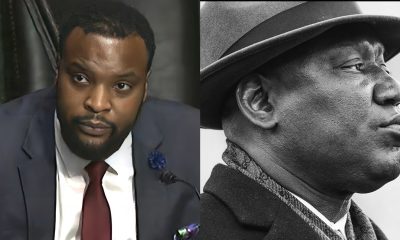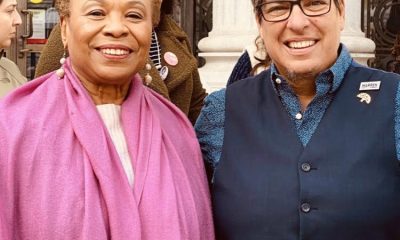National
Experts: Ferguson Must Move Quickly to Rebuild Public Trust

Gina Gowdy joins protesters on the street outside a Ferguson, Mo., fire station, Wednesday, March 4, 2015, in Ferguson. The Justice Department on Wednesday cleared a white former Ferguson police officer in the fatal shooting of an unarmed black 18-year-old, but also issued a scathing report calling for sweeping changes in city law enforcement practices it called discriminatory and unconstitutional. (AP Photo/Charles Rex Arbogast)
JIM SALTER, Associated Press
ST. LOUIS (AP) — The federal government’s withering report on the Ferguson Police Department issued a stern mandate to city leaders: Reform your law-enforcement practices and rebuild relations with the black community.
It won’t be swift or simple, particularly if the same police chief is in charge and many of the same officers are on the beat. Some residents and civic leaders want to see wholesale changes in leadership or even complete dissolution of the department.
At the very least, experts said Thursday, Ferguson must move quickly, and publicly, to prove it is serious about regaining public trust.
The Justice Department on Wednesday cleared Darren Wilson, the white former Ferguson officer who shot Michael Brown, of federal civil rights charges in the death of the 18-year-old, who was black and unarmed.
But a separate report released simultaneously found patterns of racial profiling, bigotry and profit-driven law enforcement and court practices in the St. Louis County suburb that has come to represent the tension between minorities and American police nationwide. Most of Ferguson’s police officers and city leaders are white, but two-thirds of the 21,000 residents are black.
Meanwhile, attorneys for Brown’s parents on Thursday announced plans for a wrongful-death lawsuit against the city and Wilson. They did not say specifically when the complaint would be filed. Brown’s parents attended the news conference announcing the case but did not speak or take questions.
Attorney Anthony Gray said the lawsuit will offer a “more accurate picture” of the fatal confrontation between Brown and the officer.
“He had other options to him,” Gray said of Wilson. “He chose deadly force as his option.” Gray called that choice “unreasonable and unnecessary.”
The Justice Department found that black drivers were more than twice as likely as others to be searched during routine traffic stops. Minority residents bear the burden of fines and court costs expected to generate $3 million this fiscal year. Black residents were more likely to face excessive force from police, often during unwarranted stops.
Police Chief Tom Jackson, in a reply to a texted interview request, said only, “I’m still looking into this report.” Messages seeking comment from Ferguson Mayor James Knowles III and attorneys for Wilson were not returned.
The report also included seven racially tinged emails that did not result in punishment. Knowles said Wednesday that three employees were responsible for those emails. One was fired Wednesday, and the other two are on administrative leave pending an investigation, he said.
The report spurred calls from some for St. Louis County or another municipality to take over the department. Others urged Jackson to resign, or for the city to fire him.
“The chief has no credibility,” said state Sen. Maria Chappelle-Nadal, a Democrat who represents Ferguson. “How in the world did the chief of police not know that there was an undercurrent of racism that existed in his police department?”
Other political leaders were more measured in their assessment but still pressed for improvements.
“Facts exposed in the Department of Justice’s report on the Ferguson Police Department are deeply disturbing and demonstrate the urgent need for the reforms I have called for, some of which the General Assembly is now considering, including reforms to municipal courts,” Gov. Jay Nixon said in a statement.
Criminology experts aren’t sure change is possible without new leadership, but they agreed the city must move quickly in response.
“Every hour that goes by without them doing something solidifies in the minds of people in Ferguson and elsewhere that they either don’t know what they’re doing or that they’re dismissive of the DOJ report,” said Remy Cross, a criminology and sociology professor at Webster University in suburban St. Louis.
Jens David Ohlin, law professor at the Cornell Law School in Ithaca, New York, said it is vital for Ferguson leaders to embrace the findings, rather than become defensive.
“The smartest thing for them to do is to commit themselves publicly to reforming their policing and judicial practices and tell the community and the rest of the country that they are grateful to the Justice Department, and they are going to make changes as quickly as possible,” Ohlin said.
At a brief news conference Wednesday, the mayor tried to show that Ferguson is serious about reform, saying the city has been working for some time to find more black officers. Only four of the current 54 commissioned officers are black.
Ferguson has also empaneled a civilian review board to consider complaints against officers and launched an “Explorer” program in a local school district, aiming to interest young people in law-enforcement careers, the mayor said.
Back in September, the city council passed a law capping municipal court revenues at 15 percent of the overall budget and made changes to ease court cost and fee burdens.
Those efforts weren’t enough for the Rev. Al Sharpton, the chief eulogist at Brown’s funeral. He said Knowles’ remarks were “mostly evasive, insignificant and showed a total failure to address the need for a change in leadership at the police department.”
___
Associated Press Writer Jim Suhr in St. Louis contributed to this report.
Copyright 2015 The Associated Press. All rights reserved. This material may not be published, broadcast, rewritten or redistributed.
Arts and Culture
In ‘Affrilachia: Testimonies,’ Puts Blacks in Appalacia on the Map

By Terri Schlichenmeyer
The Bookworm Sez
An average oak tree is bigger around than two people together can reach.
That mighty tree starts out with an acorn the size of a nickel, ultimately growing to some 80 feet tall, with a canopy of a hundred feet or more across.
And like the new book, “Affrilachia” by Chris Aluka Berry (with Kelly Elaine Navies and Maia A. Surdam), its roots spread wide and wider.
Affriclachia is a term a Kentucky poet coined in the 1990s referring to the Black communities in Appalachia who are similarly referred to as Affrilachians.
In 2016, “on a foggy Sunday morning in March,” Berry visited Affrilachia for the first time by going the Mount Zion AME Zion Church in Cullowhee, North Carolina. The congregation was tiny; just a handful of people were there that day, but a pair of siblings stood out to him.
According to Berry, Ann Rogers and Mae Louise Allen lived on opposite sides of town, and neither had a driver’s license. He surmised that church was the only time the elderly sisters were together then, but their devotion to one another was clear.
As the service ended, he asked Allen if he could visit her. Was she willing to talk about her life in the Appalachians, her parents, her town?
She was, and arrangements were made, but before Barry could get back to Cullowhee, he learned that Allen had died. Saddened, he wondered how many stories are lost each day in mountain communities where African Americans have lived for more than a century.
“I couldn’t make photographs of the past,” he says, “but I could document the people and places living now.”
In doing so he also offers photographs that he collected from people he met in ‘Affrilachia,’ in North Carolina, Georgia, Kentucky, and Tennessee, at a rustic “camp” that was likely created by enslaved people, at churches, and in modest houses along highways.
The people he interviewed recalled family tales and community stories of support, hardship, and home.
Says coauthor Navies, “These images shout without making a sound.”
If it’s true what they say about a picture being worth 1,000 words, then “Affrilachia,” as packed with photos as it is, is worth a million.
With that in mind, there’s not a lot of narrative inside this book, just a few poems, a small number of very brief interviews, a handful of memories passed down, and some background stories from author Berry and his co-authors. The tales are interesting but scant.
For most readers, though, that lack of narrative isn’t going to matter much. The photographs are the reason why you’d have this book.
Here are pictures of life as it was 50 years or a century ago: group photos, pictures taken of proud moments, worn pews, and happy children. Some of the modern pictures may make you wonder why they’re included, but they set a tone and tell a tale.
This is the kind of book you’ll take off the shelf, and notice something different every time you do. “Affrilachia” doesn’t contain a lot of words, but it’s a good choice when it’s time to branch out in your reading.
“Affrilachia: Testimonies,” by Chris Aluka Berry with Kelly Elaine Navies and Maia A. Surdam
c.2024, University of Kentucky Press, $50.00.
Black History
Alice Parker: The Innovator Behind the Modern Gas Furnace
Born in Morristown, New Jersey, in 1895, Alice Parker lived during a time when women, especially African American women, faced significant social and systemic barriers. Despite these challenges, her contributions to home heating technology have had a lasting impact.

By Tamara Shiloh
Alice Parker was a trailblazing African American inventor whose innovative ideas forever changed how we heat our homes.
Born in Morristown, New Jersey, in 1895, Parker lived during a time when women, especially African American women, faced significant social and systemic barriers. Despite these challenges, her contributions to home heating technology have had a lasting impact.
Parker grew up in New Jersey, where winters could be brutally cold. Although little is documented about her personal life, her education played a crucial role in shaping her inventive spirit. She attended Howard University, a historically Black university in Washington, D.C., where she may have developed her interest in practical solutions to everyday challenges.
Before Parker’s invention, most homes were heated using wood or coal-burning stoves. These methods were labor-intensive, inefficient, and posed fire hazards. Furthermore, they failed to provide even heating throughout a home, leaving many rooms cold while others were uncomfortably warm.
Parker recognized the inefficiency of these heating methods and imagined a solution that would make homes more comfortable and energy-efficient during winter.
In 1919, she patented her design for a gas-powered central heating system, a groundbreaking invention. Her design used natural gas as a fuel source to distribute heat throughout a building, replacing the need for wood or coal. The system allowed for thermostatic control, enabling homeowners to regulate the temperature in their homes efficiently.
What made her invention particularly innovative was its use of ductwork, which channeled warm air to different parts of the house. This concept is a precursor to the modern central heating systems we use today.
While Parker’s design was never fully developed or mass-produced during her lifetime, her idea laid the groundwork for modern central heating systems. Her invention was ahead of its time and highlighted the potential of natural gas as a cleaner, more efficient alternative to traditional heating methods.
Parker’s patent is remarkable not only for its technical innovation but also because it was granted at a time when African Americans and women faced severe limitations in accessing patent protections and recognition for their work. Her success as an inventor during this period is a testament to her ingenuity and determination.
Parker’s legacy lives on in numerous awards and grants – most noticeably in the annual Alice H. Parker Women Leaders in Innovation Award. That distinction is given out by the New Jersey Chamber of Commerce to celebrate outstanding women innovators in Parker’s home state.
The details of Parker’s later years are as sketchy as the ones about her early life. The specific date of her death, along with the cause, are also largely unknown.
Activism
U.S. House Minority Leader Hakeem Jeffries Speaks on Democracy at Commonwealth Club
Based on his first speech as House minority leader, “The ABCs of Democracy” by Grand Central Publishing is an illustrated children’s book for people of all ages. Each letter contrasts what democracy is and isn’t, as in: “American Values over Autocracy”, “Benevolence over Bigotry” and “The Constitution over the Cult.”

By Linda Parker Pennington
Special to The Post
House Minority Leader Hakeem Jeffries addressed an enthusiastic overflow audience on Monday at San Francisco’s Commonwealth Club, launching his first book, “The ABCs of Democracy.”
Based on his first speech as House minority leader, “The ABCs of Democracy” by Grand Central Publishing is an illustrated children’s book for people of all ages.
Each letter contrasts what democracy is and isn’t, as in: “American Values over Autocracy”, “Benevolence over Bigotry” and “The Constitution over the Cult.”
Less than a month after the election that will return Donald Trump to the White House, Rep. Jeffries also gave a sobering assessment of what the Democrats learned.
“Our message just wasn’t connecting with the real struggles of the American people,” Jeffries said. “The party in power is the one that will always pay the price.”
On dealing with Trump, Jeffries warned, “We can’t fall into the trap of being outraged every day at what Trump does. That’s just part of his strategy. Remaining calm in the face of turmoil is a choice.”
He pointed out that the razor-thin margin that Republicans now hold in the House is the lowest since the Civil War.
Asked what the public can do, Jeffries spoke about the importance of being “appropriately engaged. Democracy is not on autopilot. It takes a citizenry to hold politicians accountable and a new generation of young people to come forward and serve in public office.”
With a Republican-led White House, Senate, House and Supreme Court, Democrats must “work to find bi-partisan common ground and push back against far-right extremism.”
He also described how he is shaping his own leadership style while his mentor, Speaker-Emeritus Nancy Pelosi, continues to represent San Francisco in Congress. “She says she is not hanging around to be like the mother-in-law in the kitchen, saying ‘my son likes his spaghetti sauce this way, not that way.’”
-

 California Black Media4 weeks ago
California Black Media4 weeks agoCalifornia to Offer $43.7 Million in Federal Grants to Combat Hate Crimes
-

 Black History4 weeks ago
Black History4 weeks agoEmeline King: A Trailblazer in the Automotive Industry
-

 California Black Media4 weeks ago
California Black Media4 weeks agoGov. Newsom Goes to Washington to Advocate for California Priorities
-

 California Black Media4 weeks ago
California Black Media4 weeks agoCalifornia Department of Aging Offers Free Resources for Family Caregivers in November
-

 Activism3 weeks ago
Activism3 weeks agoOakland Post: Week of November 27 – December 3, 2024
-

 Activism4 weeks ago
Activism4 weeks agoOCCUR Hosts “Faith Forward” Conference in Oakland
-

 Activism4 weeks ago
Activism4 weeks agoRichmond Seniors Still Having a Ball After 25 Years
-

 Activism2 weeks ago
Activism2 weeks agoButler, Lee Celebrate Passage of Bill to Honor Congresswoman Shirley Chisholm with Congressional Gold Medal





















































